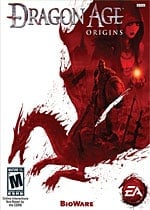Redefining Epic
Dragon Age: Origins is an innovative, masterfully crafted RPG from perhaps the greatest developer of such titles. Whereas most games in the genre fixate on level-grinding, Dragon Age emphasizes storytelling and intuitive combat, while still providing deep character development. Many tired conventions have gone out the window or have been reinterpreted to bring about a fresh, truly engaging experience. This is the best fantasy RPG to drop since The Elder Scrolls IV: Oblivion; more than filling the void left behind by that title.
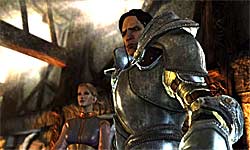
Dragon Age: Origins has players take on the role of a character pitted in a worldwide struggle of good versus evil. Though you can play the game as a paragon of virtue, a shameless, ego-centric bastard, or any combination of the two, you’ll inevitably go up against the horrific Darkspawn blight and their attempts to resurrect the Archdemons – creatures of immense power and pure evil. While the narrative may seem quite conventional, the plot twists and turns, molding itself convincingly to your actions, putting you in control of the fate of Ferelden.
Though I’m a Diablo fanatic from way back (I even played through it on the original PlayStation), the days of such hack ‘n slash fare is no longer fulfilling. Dragon Age takes a somewhat different tact. Instead of having players button-mash their way to victory, you’ll take control of a party of heroes and have to marshal them around the battlefield. As such, combat is quite reminiscent of that found in Baldur’s Gate and Knights of the Old Republic. In fact, the parallels between those games and that of Dragon Age extend into the ported nature, too – the console versions of those titles as well as those of Dragon Age, while compelling translations of the core gameplay mechanic, don’t quite live up to the standard set on PC.
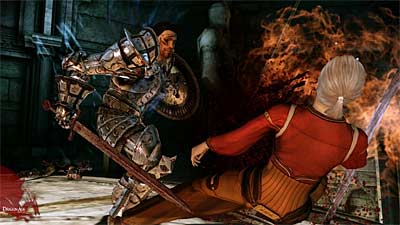
If you haven’t had a chance to play those games, know that mid-battle pausing to issue orders to your party rules the day, and positioning, attack style, and character role all play a vital part in your success. While this is executed nearly flawlessly on PC, it’s essentially left out of the console versions in favor of action-oriented gameplay. That doesn’t mean you can’t execute strategies, or that the console versions are relegated to a mundane hack ‘n slash, it’s just not nearly as complex. In the end, this may prove to be less of a concern to most console players considering the faster-paced tastes of the demographic.
Unlike the tactics-heavy gameplay of the PC, which could be Dragon Age’s most rewarding facet, players will simply fight their way through the hordes of creatures aligned against them by executing attacks through power-mapped buttons and radial menus. I was happy with just how slick and easy it was to go through the game this way. Unfortunately, the extreme level of difficulty and challenge present in the PC version has been totally Nerfed by the console controller. Expect to go through quests, the story, and boss fights much more quickly and find the gameplay less rewarding.
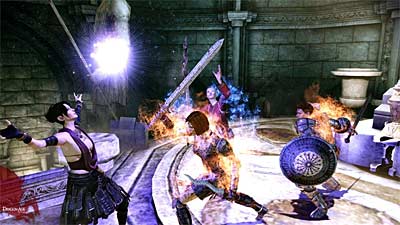
On the upside, the console versions still have all of the depth in terms of character creation, origin stories, fantastic loot, and varied enemies and environments. Outside of combat, Dragon Age: Origins is keenly focused on telling great stories. The overarching plot is an epic tale of the struggle between the goodly races of Ferelden and the evil taint that afflicts the world. Going deeper within that tale, players will also come across intrigue between power groups, significant racial tensions, powerful love triangles, and layers of decisions that shape their character and even the makeup and outlook of your party. What’s more, every play-through will be different, assuming you select a new class and race each time. Rather than simply affecting the way your character deals with combat threats, the race you choose, its background, and its class will give you a distinct origin story and determine how NPCs interact with you. While this isn’t as revolutionary in practice as I had hoped, it definitely goes a long way toward providing the game with real replay value and lasting appeal.
Like any good RPG, leveling in Dragon Age is quite satisfying. In fact, rather than feeling like a power-grind, it’s much more like developing a character. Rather than getting railroaded onto a set track, players will have lots of power selections and even four class-specific specialties from which to choose.
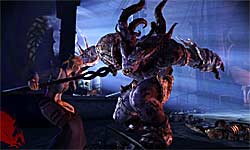
That means I could play a mage, warrior, or rogue in vastly different ways due to the secondary fighting styles (sword and shield vs. two-weapon vs. two-handed, etc.) and the back-story that accompanies each specialty. For example, you could create an Arcane Warrior mage with shapeshifting capabilities concentrated on entropic and primal powers. The next time you could play as a Templar and Champion that destroys enemies through vicious two-handed weapons and an indomitable will. As such, making your way through Dragon Age: Origins multiple times seems less of a chore and more of a challenge.
Production value in Dragon Age is extremely high. The impressive amount of voice work is all outstanding, effectively bringing the player deep into the story. Also, the booming sound effects and epic musical themes really help the action hit home. Additionally, the sweeping, detailed environments really set the tone and nicely flesh out the world, and the excellent character and creature design makes conversations and killing a whole lot more fun.
While graphical quality is generally excellent, it’s not quite as sharp as the very best games out there – Gears of War 2, Killzone 2, Uncharted 2, et al. Nevertheless, it’s still a great-looking game. If you’re a console gamer, you’re not going to have to worry about having a high-end rig to really enjoy the game, but you’re also going to miss out on some of the polish and spit-shine that has gone into it on the PC side of things.
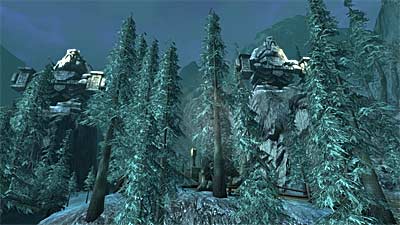
There is so much more to Dragon Age: Origins I just don’t have room to explain here. Simply know that there are tons of weapons and loot to find, craft, and coat with poison, thousands of quests to take on, storekeepers to intimidate, and NPCs to persuade. If you’re a Western-style, fantasy RPG nut, you simply can’t go wrong with Dragon Age: Origins. BioWare has outdone itself once again – they’ve created an RPG masterpiece that more than rivals its competitors, even if it loses its tactical luster in translation to consoles.
RATING OUT OF 5 RATING DESCRIPTION 4.0 Graphics
The world, characters, and creatures are nicely realized. However, it is likely not the most visually stunning game you’ve ever played, and the PC definitely holds the graphical advantage. 4.4 Control
The tactical gameplay is essentially taken out of the equation, but the power-mapped buttons and easily accessible radial menus make the action-oriented gameplay a breeze to control. 5.0 Music / Sound FX / Voice Acting
The sheer volume and quality of voice work is only outshined by the excellent ambient sound effects and epic score. 4.1 Play Value
The gameplay definitely suffers when compared to the PC version, but this is still a deep, worthwhile experience. RPG fans are sure to love everything this game has to offer. 4.2 Overall Rating – Great
Not an average. See Rating legend above for a final score breakdown.
Game Features:
